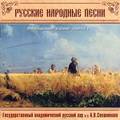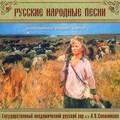Ever since it was first issued in 1965, Alexander Sveshnikov’s recording of Rachmaninoff’s “All-Night Vigil” has been regarded as a “must-have” classic by all collectors and fanciers of Russian sacred choral music. Over the subsequent decades, this recording has come in and out of availability, and now appears in Musica Russica’s catalog for the first time. One may agree or disagree with Sveshnikov’s interpretation of Rachmaninoff’s masterpiece and the degree to which it is “definitive.” On the one hand, he did graduate from the famed Moscow Synodal School, whose choir premiered the All-Night Vigil in 1915, when Sveshnikov (1890-1980) was 25 years old. On the other hand, much about this performance--the growling bass octavists, the deafening fortissimos, the brilliantly contrasting timbres of each choral section, the scooping accents--contradicts what is known about the subtlety and refinement of the Moscow Synodal style: octavists that are “felt, but never heard,” expressive restraint within the bounds of an ecclesiastical aesthetic, a timbral homogeneity approaching that of a string quartet. With several dozen recordings of Rachmaninoff’s “All-Night Vigil” now available, no doubt every conductor, every reviewer, and every listener has his or her favorite. This recording, the first ever of this work, nevertheless, stands as a unique monument that exhibits, in the person of Alexander Sveshnikov, an organic link to the mighty Russian choral tradition within which Rachmaninoff created his remarkable choral masterpiece. The booklet contains a fine essay about the work and this recording (in Russian only) by Dr Marina Rakhmanova. Titles are given in Russian and English.--V.M.




